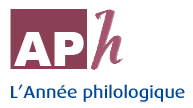Call For Papers - Dossier Gender and Intersectionality in Ancient History
Gender studies on antiquity have developed a dialogue with broader theoretical discussions of the humanities and social movements since their establishment. Currently, the concept of intersectionality appears as a new theoretical possibility of analysis. Coming from American legal discussions and coined by black lawyer and activist Kimberlé Crenshaw in 1989, the term intersectionality has given political and conceptual strength to a kind of analysis that integrates social markers of difference, such as gender, sexuality, race, ethnicity, age group, among others. In the social sciences produced in Brazil, this type of analysis preceded the creation of the term, as can be seen from the work of black sociologists, such as Lélia Gonzalez.
In the field of Ancient History and Classical Studies, the production that uses the gender approach has been dialoguing with the concept of intersectionality as a theoretical possibility to revisit old themes of analysis, complexifying them and exposing nuances. As an example, Birgitta Sjöberg's (2012) initial work, which tries to think Athenian oikos from an intersectional point of view, demonstrating how this space, as well as the female bodies that inhabit it, are crossed by a multiplicity of markers that define them. In the Brazilian context, the recent article by Semiramis Corsi (2018), proposing an intersectional analysis of the emperor Heliogábalo's representations, points to a possible resizing of this character's gender performances, when considering his specific cultural identities, social status and practices. Religious
The concept has shown that it is necessary to broaden notions of gender beyond a cultural identity that defines men and women. Gender can only be understood, as an instrument and as a concept, in the context of specific power relations that mobilize and articulate various elements. Such articulation can corroborate the contribution that the studies on antiquity have been making to highlight a multiplicity of femininity and masculinity.
We invite, therefore, researchers to submit their work that contemplates this debate, discussing the different arrangements and imbrications of social markers, in an intersectional perspective. The Journal Mare Nostrum publishes unpublished articles, which may be texts that deal with a specific research, articles of historiographical criticism, bibliographical essays and reviews. Information about the submission guidelines can be found here.
Deadline for submission: December 20th, 2019.
Organization:
Sarah Fernandes Lino de Azevedo (Universidade de São Paulo)
Thais Rocha da Silva (Universidade de Oxford)
Fabrício Sparvoli (Universidade de São Paulo)








